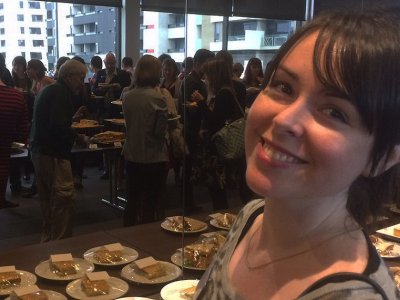
Her research found that it’s better not to grin when you win, but could she keep the smile from her face when receiving a prestigious psychology award?
University of Queensland School of Psychology researcher Dr Katharine Greenaway said her studies focussed on the social cost of expressing positive emotion, particularly in contexts where one person had triumphed over another.
"My research revealed that winners who suppress the expression of positive emotion are rated as less arrogant, more likeable, and better friends than winners who express positive emotion," she said.
Despite her findings, Dr Greenaway allowed herself a small smile of satisfaction when she received the Society of Australasian Social Psychologists (SASP) Early Career Award.
The SASP annual award is presented to an emerging scholar who has made an outstanding contribution to the field of social psychology in Australasia.
Given that the award was announced without reference to other nominees, Dr Greenaway said she felt comfortable with outwardly displaying her enjoyment at receiving the award.
"I was really honoured to be recognised in this way, with an award that places me in the company of some of the most impressive early career social psychology researchers in Australia," she said.
In the five years since receiving her PhD, Dr Greenaway has published seven book chapters and 23 articles, and has supervised two PhD students, eight Honours' theses and 19 research experience students.
She has attracted over $1 million in research funding since 2012, and is currently an Australian Research Council Discovery Early Career Researcher Award Fellow.
Dr Greenaway was the first Australian to be selected as a Canadian Institute for Advanced Research Global Scholar, working on the Social Interactions, Identity, and Well-being program between 2012 and 2014.
UQ School of Psychology researcher Professor Alex Haslam was Dr Greenaway's Postdoctoral Advisor and worked with her on the program.
"Dr Greenaway is one of the very best young researchers I have ever worked with, and I have worked with quite a few," Professor Haslam said.
"As well as her impressive publication record and grant success, she has been an involved contributor to the discipline more generally serving in key postgraduate and postdoctoral leadership roles.
"She is actively engaged in the global advancement of science, and I am convinced that her productivity is set to continue."
UQ researchers Melissa Chang and Laura Ferris were nominated for the Outstanding Postgraduate Research Award.



